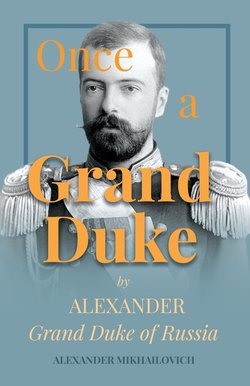Читать книгу Once A Grand Duke by Alexander Grand Duke of Russia - Alexander Mikhailovich - Страница 16
На сайте Литреса книга снята с продажи.
5
ОглавлениеPeace was signed in the summer of 1878. The following autumn we went to St. Petersburg to attend the wedding of my sister Anastasia to Friedrich, Grand Duke of Mecklenburg-Schwerin.
It being my first trip to European Russia, I was naturally the most excited member of our party. Glued to the window of the car I watched the endless panorama of the plains of Russia, so monotonous and distressing for a child raised in the vicinity of the snow-covered mountains and rapid rivers of the Caucasus. I did not like this strange country and refused to recognize it as my own. The subdued faces of the peasants, the shabbiness of the villages, the dusty towns—twenty-four hours after our train pulled out of Vladicavkas (where we arrived in carriages) I wished to be back in Tiflis. My disappointment did not escape father’s attention.
“Do not judge Russia by the appearance of its provinces,” he remarked rather apologetically, “wait till you see Moscow with its sixteen hundred churches and St. Petersburg with its palaces.”
I sighed deeply. I had heard so much about the cathedrals of the Kremlin and the luxury of the imperial court that I knew in advance I was not going to like it.
We were supposed to remain in Moscow just long enough to worship at the shrine of the miraculous ikon of the Virgin Mary of Iveria and to visit the tombs of the saints buried in the Kremlin, it being almost the official duty of every member of the imperial family passing through the ancient capital of Russia.
The Iverskaya Chapel—a decrepit, small structure—was thronged with dense crowds of people anxious to see the powerful viceroy. The depressing smell of burning candles and the very squeaky voice of the priest reciting a short Te Deum robbed me of all feelings supposed to be inspired by the sight of the miraculous ikon. I did not believe that God would choose such surroundings to reveal Himself to his children. There was nothing Christian about the whole procedure. It rather suggested a sort of gloomy paganism. I had to pretend I was praying from fear of being punished but I knew that my God, the God of golden fields, prime forests and melodious waterfalls, would never visit Iverskaya Chapel.
Next we drove to the Kremlin and had to kiss the brownish foreheads of numerous saints lying in state in silver coffins and wrapped in luxurious silver-and-gold tissues. An elderly monk dressed in black escorted us from coffin to coffin, raising their lids and pointing to us the exact spot we were expected to kiss. My head started to ache. On moment more in that stuffy atmosphere and I would have fainted.
I do not want to appear sacrilegious, nor am I trying to offend the fanatical followers of the Greek Orthodox Church; I am merely relating this episode in order to show what an awful impression this medieval performance left on the soul of a boy thirsting for a religion of beauty and love. Since my first visit to Moscow and during the following forty years spent in Russia I must have kissed the skulls of those saints many hundreds of times. On each occasion I suffered acutely and never experienced even an inkling of religious ecstasy. Today, at the age of sixty-five, I am still fervent in my conviction that God should never be worshiped in the manner bequeathed to Christianity by the pagans.
The four hundred miles between Moscow and St. Petersburg were being closely guarded by soldiers. All along the route we saw bayonets and uniforms; at night thousands of camp-fires were lighting the way. At first we thought it had been done in father’s honor, but then we learned that the Emperor expected to visit Moscow in the near future and that extraordinary measures had been taken to protect his train against the attempts of the revolutionaries. This revelation struck us all most painfully. Things were coming to a pretty bad pass if the Czar of all the Russias had to be guarded every inch of the distance between his two capitals. It was a far cry from the days of his father, Nicholas I, who traveled practically unescorted throughout the wildest provinces of the empire. Our father looked concerned and could not disguise his worry.
The morning of our arrival in St. Petersburg happened to coincide with the commencement of a period of dense pea-soup fogs, which are likely to make even a Londoner gasp in despair. Lamps and candles were burning all over our palace. At midday it became so dark that I was not able to see the ceiling of my room.
“Yours is a particularly attractive room,” explained my tutor. “When the fog lifts you will see the Fortress of Peter and Paul, where all the Czars are buried, right across the way.”
My heart sunk. It was bad enough to be obliged to spend several months in this dark city, but to live in the neighborhood of dead bodies! Tears appeared in my eyes. How I did hate St. Petersburg on that morning. For that matter, I hated it all my life. Whenever I feel homesick for Russia, I wish I could see once more the Caucasus and the Crimean Peninsula, but I sincerely hope I shall never again lay my eyes on the former capital of my ancestors.
I remember discussing this subject with my parents. Fond as they were of St. Petersburg, having spent there the first happy years of their married life, they could not blame me for remaining partial to the Caucasus. They recognized too that while the latter suggested harmony and content, the former reeked of imminent tragedy and continuous sorrow.
